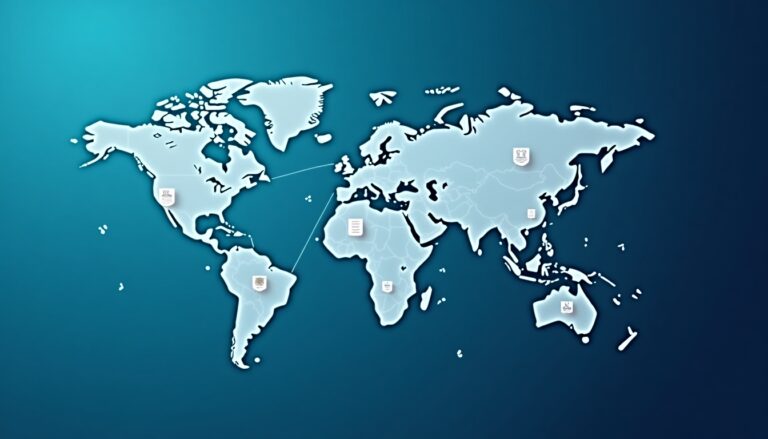MLM companies operating internationally must navigate complex regulatory frameworks across different jurisdictions to maintain legal compliance.
Key International MLM Regulations
Each country maintains distinct laws governing multi-level marketing operations, compensation structures, and product claims.
- United States: Federal Trade Commission (FTC) oversees MLM operations through the FTC Act and Business Opportunity Rule
- European Union: Consumer Rights Directive and Unfair Commercial Practices Directive apply to MLM businesses
- China: Direct selling requires specific licenses and follows strict operational guidelines under the Direct Sales Regulations
- India: Prize Chits and Money Circulation Schemes Act regulates MLM activities
Essential Compliance Requirements
- Registration and licensing in each operating country
- Clear documentation of compensation plans
- Accurate product claims and marketing materials
- Transparent income disclosure statements
- Proper distributor agreements and contracts
Product Compliance Guidelines
| Category | Requirements |
|---|---|
| Health Products | FDA, EMA, or local authority approval |
| Cosmetics | Safety assessments, ingredient compliance |
| Supplements | Label requirements, health claim restrictions |
Financial Compliance Tips
Implement robust accounting systems that track international transactions and commissions accurately.
- Monitor currency exchange compliance
- Maintain proper tax documentation
- Follow international banking regulations
- Document all cross-border transactions
Distributor Training Requirements
Create comprehensive training programs covering compliance requirements for each market.
- Marketing guidelines and restrictions
- Income claim limitations
- Product representation rules
- Local business practices and customs
Legal Resources and Contacts
Contact these regulatory bodies for specific guidance:
- FTC: www.ftc.gov/contact
- EU Commission: ec.europa.eu/info/contact
- WFDSA: wfdsa.org/contact-us/
Compliance Checklist
- ✓ Register business in each operating country
- ✓ Obtain necessary licenses and permits
- ✓ Review compensation plan compliance
- ✓ Update marketing materials per local laws
- ✓ Establish local support systems
- ✓ Create market-specific training materials
Regular compliance audits help identify and address potential issues before they become problems.
Risk Management Strategies
Developing comprehensive risk management protocols helps MLM companies maintain compliance across international markets.
- Regular compliance audits
- Third-party legal reviews
- Documentation management systems
- Crisis response procedures
Technology and Compliance Tools
Essential Software Systems
- Compliance tracking platforms
- Documentation management systems
- Automated reporting tools
- Transaction monitoring software
Digital Compliance Solutions
| Tool Type | Primary Function |
|---|---|
| Compliance Dashboard | Real-time monitoring and alerts |
| Document Management | Centralized storage and version control |
| Training Platform | Distributor education and certification |
Future Compliance Considerations
Stay prepared for evolving regulatory landscapes and emerging compliance requirements.
- Digital currency regulations
- E-commerce compliance updates
- Cross-border data protection laws
- Sustainable business practices
Conclusion
Successful international MLM operations require ongoing commitment to regulatory compliance across all jurisdictions. Companies must:
- Maintain current knowledge of regulatory requirements
- Implement robust compliance systems
- Provide comprehensive distributor training
- Conduct regular compliance audits
- Adapt to evolving regulatory landscapes
Regular review and updates of compliance protocols ensure sustainable international operations and minimize legal risks.
FAQs
- What are the key international regulations governing MLM operations globally?
The main regulations include the FTC Act in the USA, EU Directive 2005/29/EC for Europe, the Direct Selling Regulations in Asia-Pacific countries, and specific anti-pyramid scheme laws in various jurisdictions. Each country has its own regulatory framework for MLM operations. - How do compensation structure requirements differ between countries?
Different countries have varying requirements for compensation plans. The US requires clear income disclosure statements, while the EU mandates transparent earning potential documentation. Asian countries often limit the number of distribution levels, and some nations cap commission percentages. - What are the common product registration requirements for MLM companies operating internationally?
Products must typically be registered with local regulatory authorities, meet safety standards, and comply with labeling laws. Cosmetics require registration with agencies like the FDA or EMA, while nutritional supplements need specific certifications in each market. - What documentation is required for legal MLM operation in multiple countries?
Essential documents include business registration certificates, product certifications, compensation plan approval, tax registration, direct selling licenses, and compliance declarations with local MLM regulations. - How do countries differ in their pyramid scheme prevention regulations?
Some countries require minimum retail sales percentages (like the 70/30 rule in the US), others mandate product buyback policies, and many enforce restrictions on recruitment-based earnings. Some jurisdictions completely prohibit certain MLM practices. - What are the international requirements for income and earnings claims?
Most countries require documented proof for income claims, transparent income disclosure statements, and prohibit exaggerated earning potential promises. The EU and US have strict guidelines on earnings representation. - How do refund and cooling-off period requirements vary globally?
Cooling-off periods range from 7 to 14 days in most countries. The EU requires 14 days, while Asian countries typically require 7-10 days. Product return policies must comply with local consumer protection laws. - What are the cross-border transaction regulations for MLM companies?
Companies must comply with international trade laws, customs regulations, currency exchange rules, and cross-border taxation requirements. Some countries require local business entities for MLM operations. - How do digital marketing restrictions apply to international MLM operations?
Digital marketing must comply with GDPR in Europe, CAN-SPAM Act in the US, and similar data protection laws globally. Social media marketing guidelines vary by country and platform. - What are the membership agreement requirements across different jurisdictions?
Membership agreements must be in local languages, clearly state terms and conditions, include cancellation rights, and comply with local contract laws. Some countries require government approval of distributor agreements.








